Politics
From Thatcher to Trump and Brexit: my seven lessons learned after 28 years as Guardian economics editor | Larry Elliott Economics editor
Margaret Thatcher was prime minister and Nigel Lawson her chancellor of the exchequer. Neil Kinnock was leader of the Labour party. The iron curtain separated Europe.
Across the Atlantic, Ronald Reagan’s second term in the White House was drawing to a close. Donald Trump floated the idea that George Bush might want him as his running mate in the looming US presidential election, an overture Bush described as “strange and unbelievable”.
This was the political backdrop when I joined the Guardian in 1988 – the year before Tim Berners-Lee invented the world wide web, when mobile phones were in their infancy and the climate crisis was just starting to become a hot political issue.
It was a time when free market ideas ruled. A combination of high inflation and recession – stagflation – in the 1970s had led to a crisis of postwar social democracy and given rise to a new set of beliefs: privatisation, deregulation, tax cuts paid for by shrinking the state, curbs on the power of trade unions, the dismantling of capital controls. All this would give capitalism its mojo back, leading to wealth creation that would trickle down from those at the top to those struggling at the bottom.
Since this is my last column after more than 28 years as the Guardian’s economics editor, I thought I would devote it to some lessons learned during my time on the paper.
Lesson No 1 is that the free-market experiment has failed, as some of us said it would all along. Wealth did not trickle down, and instead the gap between the haves and the have-nots widened. The workers laid off when the factories closed in northern England and the US midwest did not find new well-paid jobs but were either thrown on the scrapheap or found low-paid insecure work in call centres and distribution warehouses.
Financial speculation ran rife once controls on capital were removed, but growth rates in the west were slower than in the postwar heyday of social democracy. Warnings of trouble ahead were ignored until the world’s banking system came close to collapse in the global financial crisis of 2008. At which point, policymakers abruptly ditched free-market values and rediscovered the virtues of state ownership, interventionist industrial strategies and demand management.
But only temporarily. Lesson No 2 is that ideas matter. The near death of the banks provided an opportunity to forge a new progressive approach to the economy in the shape of a Green New Deal, but it was not taken. In part, that was because various parts of the left – the Keynesians, the greens, the Marxists – all had differing views on what needed to be done. In part it was because the rich and powerful used their money and influence to stymie any hope of real change. In part, it was because of the timidity of parties of the left.
The upshot is that there has been no equivalent of the Thatcher-Reagan revolution of the 1980s, even though the crisis of neoliberalism in 2008 was just as profound as the collapse of social democracy in the 1970s. A form of zombie capitalism has staggered on for a decade and a half, kept alive by cheap money liberally provided by central banks. Ultra-low interest rates have failed to boost investment. Real wage growth has been nugatory.
Those at the sharp end of economic failure looked to parties of the left for answers to their concerns: low pay, job insecurity, run-down public services, a fear of crime, the consequences of mass immigration. What they got instead were lectures about the need to eat better, smoke and drink less, and to stop being such bigots.
Trump’s victory last week shows what happens when the left first abandons its natural supporters and then tells them what to think and behave. That’s lesson No 3: populism will continue to flourish until the left comes up with a credible and deliverable economic plan.
Trump won because he promised to give voters what they wanted rather than what America’s liberal elite thought they ought to want.
Trump’s impending return to the White House highlights a fourth lesson from the past 36 years: the world’s economic centre of gravity – symbolised by the emergence of China and India as forces to be reckoned with – has moved from west to east and from north to south. To be sure, China has some deep structural problems, but it has lifted 800 million people out of poverty since the late 1970s, has developed expertise in hi-tech manufacturing, and poses a bigger threat to US hegemony than the Soviet Union ever did.
after newsletter promotion
Lesson No 5 is that globalisation has gone into reverse. The new cold war between China and the US, the vulnerability of global supply chains exposed by the Covid pandemic, and voter demands that their political leaders reassert control over the economy are all leading to a revival of the nation state. Free trade is out; protectionism is in. Governments are responding to pressure to curb migration. Activist industrial strategies are back in vogue.
The European Union is finding adjustment to these new challenges difficult. That’s hardly surprising, given that the EU was – as Wolfgang Streeck notes in his book Taking Back Control? – the “perfect realisation” of post-communist neoliberal economic globalism: centralised, depoliticised, bureaucratic and wedded to free movement of people, goods, services and capital.
As the Guardian’s resident Eurosceptic, I have to say I have never seen anything especially attractive in the EU’s economic model. Nor can the project of ever-closer union remotely be called a success. The EU is sclerotic and seething with voter rage at the inability of its governments to raise living standards or control immigration.
So my sixth lesson is that those who say Brexit has failed are not just jumping the gun but need to look across the English Channel, because that’s where the real failure lies. Brexit was to Britain what Trump’s victory was for the US: a revolt against the elites and a demand for change. It offers the chance for a party of the left to do things differently. Labour can seize that opportunity.
That’s not a conclusion, I am well aware, that most of my readers would agree with, but one of the joys of working for the Guardian is that it encourages – indeed welcomes – challenges to the orthodoxy.
So my final lesson from the past 36 years is this: it is always worth questioning the status quo. Just because something is the received wisdom doesn’t mean it is right.
Politics
Neil Gray ‘sorry’ after chauffeur trips to football

Health Secretary Neil Gray has said he is sorry he did not go to a “wider range” of football matches after using ministerial cars to attend four Aberdeen games.
The Dons fan was driven by a chauffeur to watch three games at Hampden, as well as a home match. He registered the events as official government visits.
In a statement to parliament, Gray said he should have attended a greater variety of games to avoid giving the impression he was acting “more as a fan and less as a minister”.
The Scottish Conservatives accused him of having a “jolly to watch the football” at taxpayers’ expense.
Gray also said he had used the chauffeur service for five Scotland games.
The health secretary told MSPs that he had been joined by a family member or guest at six of the matches. He said that they travelled with him but at no additional cost to the taxpayer.
Gray said all the engagements were “official ministerial business”, and that he had not planned to attend only Aberdeen club matches.
He said: “I should have made sure that I attended a wider range of games and not just Aberdeen, and I apologise for my error.”
The SNP MSP added: “I am a football fan. I follow Aberdeen. But I should not have allowed the impression to be given that this played any role in my engagements and I am sorry for my error.”
 PA Media
PA MediaGray was given VIP tickets to Aberdeen matches at Hampden three times, once in his current role and twice when he was wellbeing economy, fair work and energy secretary.
The Airdrie and Shotts MSP watched Aberdeen v Hibernian in Scottish League Cup semi-final in November, and the final against Rangers in December, as well as the semi-final of the Scottish Cup against Celtic in April.
The minister was also driven to an Aberdeen home league match against Livingston in May during a day of ministerial visits in the city.
He said he was a guest of the SPFL at the first two matches, and of the SFA at the Celtic match.
Gray told MSPs he discussed a range of issues at the Hampden matches, including pyrotechnics, business engagement in sport and the SPFL’s work to support community wellbeing.
In March 2022, while serving as minister for culture, Europe and international development, Gray used the chauffeur service to go to Scotland matches against Ukraine and Poland.
After becoming economy secretary, he was driven to two European Championship qualifiers against Georgia and Norway in June and November 2023.
Last month, he attended Scotland’s game against Portugal at Hampden.
‘Taxpayers duped’
Scottish Conservatives called for a parliamentary investigation under the ministerial code.
Deputy leader Rachael Hamilton accused Gray said: “Taking family members and guests to these games, in limos paid for by the taxpayer, confirms beyond all doubt that these meetings were not government business, but a jolly to watch the football.
“Taxpayers have been duped and Neil Gray must now refund them in full.”
Gray said the ministerial code makes clear that family members or guests can accompany a minister.
Labour MSP Neil Bibby said the minister’s attendance at the Aberdeen v Livingston game at Pittodrie has “raised particular eyebrows” and asked for further details of the discussions to be published.
Scottish Greens co-leader Patrick Harvie said the “real issue” was the minister’s use of a government car and there would not have been a problem had he used public transport.
Speaking to journalists following Gray’s statement, First Minister John Swinney said he would not refer the health secretary for an investigation under the ministerial code.
He said the statement had addressed “all the issues that need to be considered” and he now considers the matter “closed”.
Politics
Donald Trump: I don’t think he is racist
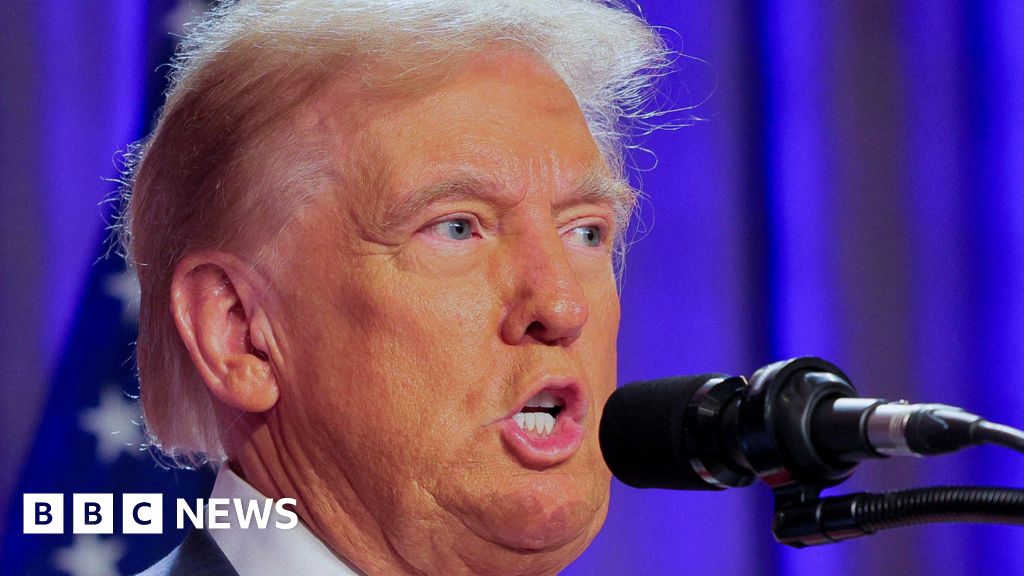
Wales’ first minister has said she does not think the incoming US president Donald Trump is racist.
During a BBC radio phone-in, Labour’s Eluned Morgan said: “There were a hell of a lot of black people and Latinos who voted for him in the election.”
Her words contrast with those of Labour London Mayor Sadiq Khan, who called Trump “racist”, “sexist” and a “homophobe” in an interview in May and urged his party to “call him out”.
Speaking on Radio 5 Live on Thursday, Morgan said the UK had to “keep as good a relationship with the United States as we can”.
UK Labour Labour Foreign Secretary David Lammy previously called Trump a “neo-Nazi-sympathising sociopath”, in 2018 when he was a backbench MP, but has dismissed those comments as “old news“, insisting he would be able to find “common ground” with the president-elect.
On Thursday morning’s phone-in Morgan was asked by presenter Nicky Campbell if Trump was a racist.
“I shouldn’t think he is, to be honest,” she said.
“There were a hell of a lot of black people and Latinos who voted for him in the election.”
The first minister added that the American vote had to be respected: “We need a strong relationship with the United States irrespective of who leads the country.
“It’s our biggest area in terms of inward investment,” she said.
She said she was worried about the potential of additional tariffs, however. “It will hit our economy,” she warned.
During his election campaign Trump pledged to impose a 20% tariff on all imports into the United States and a 60% tariff on Chinese imports.
During Thursday’s programme, which marked Morgan’s first 100 days leading the Welsh government, the first minister also called for farmers to “calm down a bit” over changes to inheritance tax.
Politics
Council tax in England set to rise by up to 5%

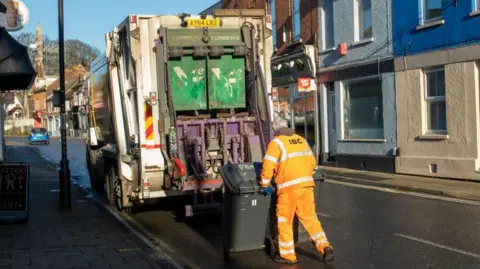 Getty Images
Getty ImagesCouncil tax bills in England are set to rise by up to 5% next April, after the government confirmed it was sticking with the current cap on increases.
Communities Minister Matthew Pennycook told the Commons this was the “right threshold”, as he pointed to the pressures on council budgets.
It means the average household faces an above-inflation increase of more than £100 to their to their council tax bill next year.
Pennycook said the government expects an extra £1.8bn to be raised through council tax in 2025/26.
But the Conservatives claimed Labour had left a “black hole” in council finances.
Under current rules, councils in England providing social care services can increase tax rates by up to 5%, while others can increase rates by up to 3%.
Councils who want to increase bills above this level must get permission from the government or hold a referendum.
According to government figures, the average band D council tax set by local authorities in England for 2024-25 was £2,171 – an increase of £106 or 5.1% on the previous year.
On Wednesday, the prime minister’s press secretary told reporters the 5% threshold set by the previous government “remains the same”.
It came after Conservative leader Kemi Badenoch pressed Sir Keir Starmer during Prime Minister’s Questions over whether the cap would be kept in place, with the PM sidestepping the question.
Answering an urgent question on the issue in the House of Commons on Thursday, Pennycook defended the decision to keep the cap.
The minister said the government was committed to protecting the most vulnerable through the 25% discount on council tax for people who live alone and other support schemes.
He added that this means more than eight million households do not pay a full council tax bill.
Pennycook was also challenged over the financial pressures facing councils.
Liberal Democrat MP Lee Dillon said his party was “deeply concerned that people are simply paying more council tax for fewer services”.
He highlighted the increased costs for councils from inflation, wages and demand for local services and urged the minister to ensure they did not have to close libraries, cut bus routes or reduce road repairs as a result.
In response, Pennycook said: “The government certainly recognises the pressures on local authorities and the burdens placed on households as a result of 14 years in which local government was run down.”
“We are determined to turn that situation around,” he added, pointing to an extra £4bn in new funding for councils in last month’s Budget.
The Local Government Association has welcomed the extra funding for councils, but warned they still face significant pressures in areas like adult and children’s social care and homelessness support.
The County Councils Network also said the money “does not eradicate councils’ funding gap”, meaning they would “have little choice but to raise council tax and still need to take difficult decisions over services to balance their budgets”.
Conservative shadow communities minister David Simmonds claimed the government had left a £2.4bn “black hole” in councils budgets.
“Answers to parliamentary questions show that the government is expecting spending power to increase by £3.7bn, funded by grants of £1.3bn,” he told the Commons.
He added: “Whilst nobody would want to see the [council tax rise] referendum limit scrapped simply to bail out central government, the announcement of the 5% constrains local authorities when it comes to their fundraising.
“Will it be our High Streets through increased business rates or will it be other council services through significant cuts that will need to fill their £2.4bn black hole?”
Pennycook rejected the figure, saying it did not take account of more than £300m raised in business rates and an expected £300m in additional new housing.
He pointed out that the 5% cap on council tax rises was in place when the Conservatives were in government and called on the party to clarify whether they believed it should be abolished or reduced.
Politics
Building more prisons not answer to crisis, says review chief
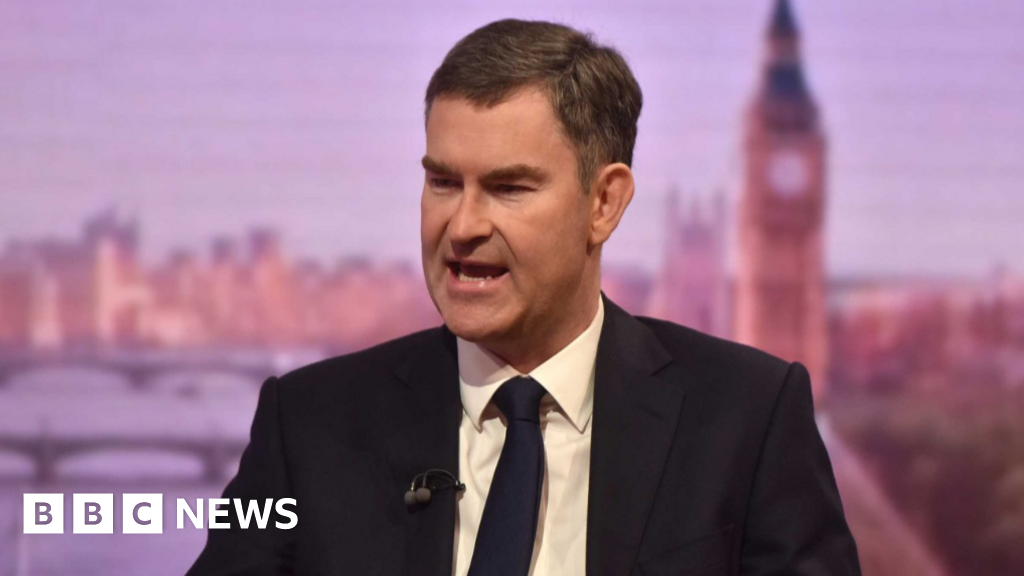
The man in charge of a review of the prisons crisis says building more jails is not the answer and a more “strategic” approach is needed to free up space.
The former Conservative Justice Secretary David Gauke has been called in by Labour to review sentencing, following the early release of nearly 3,000 offenders in recent weeks.
The sentencing review was a Labour manifesto pledge and the party has also appointed Lord Timpson, former head of the key-cutting chain that hires ex-offenders and chief of the Prison Reform Trust, as its prisons minister.
Gauke, who was justice secretary under Theresa May, has previously suggested that jail terms of less than six months should be scrapped.
The UK prison population has roughly doubled in the last 30 years, with capacity lagging behind, and in September the system came within 100 places of running out of space altogether.
Gauke told BBC Radio 4’s Today programme that this autumn’s crisis release of prisoners was unavoidable for the new Labour government because of “the circumstances they inherited”.
Stressing “I do not speak as a Labour person”, he said “any government of any colour would have been forced to make that decision, or something very like that decision, at that particular time”.
He warned projections showed demand for prison cells would continue to “increase very significantly”, but he hoped the sentencing review could help avoid the same crunchpoint in future, by reducing the number of people sent to jail.
“What we want to avoid is a situation where prisoners are being released as a short-term, reduce-the-pressure moment,” he said.
“What we have to be is more strategic – we have to make sure that prison capacity meets demand and that means we have to look at the question of demand on prison places and that’s I think where looking at the sentencing regime is necessary and important.”
The current prisons crisis had built up over 30 years, Gauke said, due to successive government decisions to make average sentences longer, creating a situation where the UK “relies much more heavily on prison than any other western European country”.
Although he said prisons were an important part of the justice system, he questioned whether the UK should keep on building more prisons because “it’s very expensive and…evidence does not suggest that it’s an effective way of reducing crime”.
Instead, he talked about using technology to create tougher non-custodial sentences, following approaches taken by other countries with much lower prison populations.
With more than half the women in jail serving sentences of six months or less, Gauke said reducing the female prison population was also an option to free up space.
He said: “Clearly there are some women prisoners who must go to prison, who commit serious offences and it’s right that prison is where they go, but I think there is a case for looking at short sentences more generally.
“There’s a particular issue with women offender who are very often themselves victims of crime, very often face issues with mental health, substance abuse and so on that could be addressed outside prison.
“So I would certainly want to look at that, and I said this as justice secretary, I think we could reduce the female prison population.”
Latest government figures show more than half of women are sent to jail for less than six months, compared to 3% of the total prison population being behind bars for that length of time.
The sentencing review is now open for submissions from the public about how the prison system can be improved and will submit findings to the Lord Chancellor by Spring 2025.
Politics
Met police faces service cuts without more cash, says chief

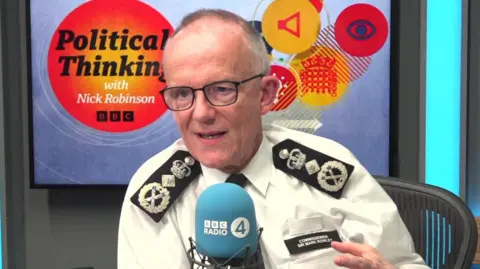 BBC
BBCThe boss of the UK’s largest police force has warned it faces “eye-watering cuts” to services unless ministers increase its funding.
Met commissioner Sir Mark Rowley told the BBC he was “deeply troubled” by talks so far on its annual settlement for next year.
He added that the force was in a “precarious position” because previously used options to “prop up” its budget had run out.
The government has said it plans to increase the overall policing budget next year – although allocations by force are still to be negotiated.
The Met’s budget for this year is just over £3.5bn, a 3.5% increase from 2023/24, comprising £2.6bn from central government and £956m from local taxes.
Sir Mark said conversations over its funding allocation from next April – which would normally be expected to be announced in December or January – were still “ongoing” with the government and City Hall.
But, speaking to BBC Radio 4’s Political Thinking with Nick Robinson, he said he was “deeply troubled by the situation we appear to be heading towards”.
Policing a global capital such as London came with an “extra set of challenges”, he said, adding that per person was lower than in other cities such as New York and Sydney.
He said that the “cumulative effect of decisions over the last decade or so” had put the force in a “more and more precarious position”, and some of its buildings would be “unusable” in a few years without further investment.
“Some of the things that successive [police] commissioners and mayors have used to balance the books – like selling police stations and using reserves – all of those things have run out,” he added.
“The chancellor has been very clear – it’s a difficult public sector context.”
‘Tough choices’
“You add all those things together, and you get a dramatic change in budgets of a scale that’s never going to be absorbed by efficiencies, and is going to require some pretty eye-watering cuts to sort of to the services we provide to London.”
He added that he was not going to get into detail at this stage on the “tough choices” the force would face without an increase in resources.
But he said he planned to specific “10 or 20 things we’re going to do differently” before Christmas.
He added that the implications for policing in the capital would “become more public” in the coming weeks.
The budget for the Home Office is set to shrink by 3.3% next year in real terms, with the bulk of this coming from assumed savings on asylum support.
At last month’s Budget, the government said it planned to “increase the core government grant for police forces,” although it did not specify whether this would be in cash terms or taking account of inflation.
Before the election, Labour also said it also planned to save £360m through more efficient purchasing of police equipment, which it promised to spend on extra community support officers.

Politics
Bid to soften change rejected by Treasury

A bid by the department for rural affairs to soften changes to inheritance tax for farms – possibly by exempting some older farmers – has been rejected by the Treasury.
The Treasury said there would be no change or mitigations to the policy, which will see an end to inheritance tax exemption for some farms.
From April 2026, farms worth more than £1m will face an effective inheritance tax rate of 20% – half the usual rate of 40%.
BBC Newsnight understands that the Department for Environment, Food and Rural Affairs (Defra), which represents the interests of farmers in government, believes it was not properly consulted over the change.
The department was informed about the policy the night before it was announced in the Budget.
The move has been branded “disastrous” by the National Farmers’ Union (NFU), with some farmers warning it would decimate the countryside.
Defra suggested softening the policy to exempt some older people, possibly those over the age of 80.
The April 2026 start for the policy means they may not have time to make use of existing rules to skip inheritance tax by passing on an asset seven years before death.
But this suggestion has been dismissed by the Treasury, which said it had taken “a fair and balanced approach”.
Since its introduction in 1984, agricultural property relief (APR) has allowed small family farms – including land used for crops or rearing animals, as well as farm buildings, cottages and houses – to be exempt from inheritance tax.
The Treasury said 40% of APR had been going to “the 7% wealthiest claimants”, and that it had “made a difficult decision to ensure the relief is fiscally sustainable”.
It put this against a backdrop of “public services crumbling [and] a £22bn fiscal hole inherited from the previous government”.
“Around 500 claims each year will be impacted and farm-owning couples can pass on up to £3m without paying any inheritance tax – this is a fair and balanced approach,” a spokesperson added.
There are divisions in government over the change.
Some ministers believe it will only have an impact on relatively wealthy farmers – a couple using all their inheritance tax benefits will be able to pass on a £3m farm tax free. Any inheritance tax charge on farms can be paid over 10 years.
But other ministers believe the chancellor is in danger of undermining Labour’s relations with rural Britain while raising a relatively small amount of money.
The change could raise around £560m.
Some sources in government have expressed concerns that the chancellor is creating unnecessary grief over a change that is not, in relative terms, a huge money spinner.
There are concerns that the change – which has proved controversial among farmers since its announcement – could become “totemic” in rural Britain.
The NFU warned it would “snatch away the next generation’s ability to carry on producing British food” and see farmers forced to sell land to pay the tax.
A rally to protest against the plan will be held in Whitehall next Tuesday.
There is also a dispute around the figures used to calculate the changes.
Farmers leaders have been told by Defra that the figures come from the Treasury and not their department.
Tom Bradshaw, the president of the NFU, said that Defra figures showed the changes would have an impact on 66% of estates.
The Treasury said the figure was 28%.
Clive Bailey, founder of the Farming Forum which is also organising a protest in central London next week, said on Thursday that any change to the new rules “would be a step forward”.
Mr Bailey, who farms in Staffordshire, said the suggested exemption should cover people much younger than 80.
Compared with the wider population, farming sees “a lot of people who should have retired already still working”, he told BBC Radio 4’s Today programme.
He called the inheritance rules “so poorly thought out”.
The cost of running a viable farm exceeded £1m, he said, arguing that the government needed to sit down “with real family farmers or agricultural economists”.
“We’re not special, but the economic circumstances of farming are very different to other industries.”
A Defra spokesperson said:
“With public services crumbling and a £22bn fiscal hole inherited from the previous government, we have made the difficult decision to reform Agricultural Property Relief in a balanced and fair way.
“All ministers support the policy and it will not change.”
-

 Science & Environment2 months ago
Science & Environment2 months agoHow to unsnarl a tangle of threads, according to physics
-

 Technology2 months ago
Technology2 months agoWould-be reality TV contestants ‘not looking real’
-

 Technology2 months ago
Technology2 months agoIs sharing your smartphone PIN part of a healthy relationship?
-

 Science & Environment2 months ago
Science & Environment2 months agoHyperelastic gel is one of the stretchiest materials known to science
-

 Science & Environment2 months ago
Science & Environment2 months agoX-rays reveal half-billion-year-old insect ancestor
-

 Science & Environment2 months ago
Science & Environment2 months ago‘Running of the bulls’ festival crowds move like charged particles
-

 Science & Environment2 months ago
Science & Environment2 months agoPhysicists have worked out how to melt any material
-

 MMA1 month ago
MMA1 month ago‘Dirt decision’: Conor McGregor, pros react to Jose Aldo’s razor-thin loss at UFC 307
-

 News1 month ago
News1 month ago‘Blacks for Trump’ and Pennsylvania progressives play for undecided voters
-

 News1 month ago
News1 month agoWoman who died of cancer ‘was misdiagnosed on phone call with GP’
-

 Money1 month ago
Money1 month agoWetherspoons issues update on closures – see the full list of five still at risk and 26 gone for good
-

 Sport1 month ago
Sport1 month agoAaron Ramsdale: Southampton goalkeeper left Arsenal for more game time
-

 Football1 month ago
Football1 month agoRangers & Celtic ready for first SWPL derby showdown
-

 Sport1 month ago
Sport1 month ago2024 ICC Women’s T20 World Cup: Pakistan beat Sri Lanka
-

 Science & Environment2 months ago
Science & Environment2 months agoA new kind of experiment at the Large Hadron Collider could unravel quantum reality
-
Business1 month ago
how UniCredit built its Commerzbank stake
-

 Science & Environment2 months ago
Science & Environment2 months agoMaxwell’s demon charges quantum batteries inside of a quantum computer
-

 Science & Environment2 months ago
Science & Environment2 months agoQuantum forces used to automatically assemble tiny device
-

 Science & Environment2 months ago
Science & Environment2 months agoSunlight-trapping device can generate temperatures over 1000°C
-

 Science & Environment2 months ago
Science & Environment2 months agoLiquid crystals could improve quantum communication devices
-

 Science & Environment2 months ago
Science & Environment2 months agoLaser helps turn an electron into a coil of mass and charge
-

 Technology2 months ago
Technology2 months agoUkraine is using AI to manage the removal of Russian landmines
-
Business1 month ago
Top shale boss says US ‘unusually vulnerable’ to Middle East oil shock
-

 Technology1 month ago
Technology1 month agoSamsung Passkeys will work with Samsung’s smart home devices
-

 MMA1 month ago
MMA1 month agoPereira vs. Rountree prediction: Champ chases legend status
-

 News1 month ago
News1 month agoNavigating the News Void: Opportunities for Revitalization
-

 Science & Environment2 months ago
Science & Environment2 months agoQuantum ‘supersolid’ matter stirred using magnets
-

 Technology2 months ago
Technology2 months agoRussia is building ground-based kamikaze robots out of old hoverboards
-

 Science & Environment2 months ago
Science & Environment2 months agoWhy this is a golden age for life to thrive across the universe
-

 News1 month ago
News1 month agoMassive blasts in Beirut after renewed Israeli air strikes
-

 Technology1 month ago
Technology1 month agoGmail gets redesigned summary cards with more data & features
-

 News1 month ago
News1 month agoCornell is about to deport a student over Palestine activism
-

 Technology1 month ago
Technology1 month agoSingleStore’s BryteFlow acquisition targets data integration
-

 Technology2 months ago
Technology2 months agoMicrophone made of atom-thick graphene could be used in smartphones
-

 Business1 month ago
Business1 month agoWater companies ‘failing to address customers’ concerns’
-

 Sport1 month ago
Sport1 month agoBoxing: World champion Nick Ball set for Liverpool homecoming against Ronny Rios
-

 Sport1 month ago
Sport1 month agoShanghai Masters: Jannik Sinner and Carlos Alcaraz win openers
-

 Entertainment1 month ago
Entertainment1 month agoBruce Springsteen endorses Harris, calls Trump “most dangerous candidate for president in my lifetime”
-

 Money1 month ago
Money1 month agoTiny clue on edge of £1 coin that makes it worth 2500 times its face value – do you have one lurking in your change?
-

 Technology1 month ago
Technology1 month agoEpic Games CEO Tim Sweeney renews blast at ‘gatekeeper’ platform owners
-

 MMA1 month ago
MMA1 month agoPennington vs. Peña pick: Can ex-champ recapture title?
-

 Technology2 months ago
Technology2 months agoMeta has a major opportunity to win the AI hardware race
-

 Science & Environment2 months ago
Science & Environment2 months agoITER: Is the world’s biggest fusion experiment dead after new delay to 2035?
-

 MMA1 month ago
MMA1 month agoDana White’s Contender Series 74 recap, analysis, winner grades
-

 MMA1 month ago
MMA1 month agoKayla Harrison gets involved in nasty war of words with Julianna Pena and Ketlen Vieira
-

 Sport1 month ago
Sport1 month agoAmerica’s Cup: Great Britain qualify for first time since 1964
-

 Science & Environment2 months ago
Science & Environment2 months agoNuclear fusion experiment overcomes two key operating hurdles
-

 News2 months ago
News2 months ago▶️ Hamas in the West Bank: Rising Support and Deadly Attacks You Might Not Know About
-

 Technology1 month ago
Technology1 month agoMicrosoft just dropped Drasi, and it could change how we handle big data
-

 Technology1 month ago
Technology1 month agoLG C4 OLED smart TVs hit record-low prices ahead of Prime Day
-

 Sport1 month ago
Sport1 month agoWXV1: Canada 21-8 Ireland – Hosts make it two wins from two
-

 News1 month ago
News1 month agoHarry vs Sun publisher: ‘Two obdurate but well-resourced armies’
-

 MMA1 month ago
MMA1 month ago‘Uncrowned queen’ Kayla Harrison tastes blood, wants UFC title run
-

 Technology2 months ago
Technology2 months agoWhy Machines Learn: A clever primer makes sense of what makes AI possible
-

 Science & Environment2 months ago
Science & Environment2 months agoNerve fibres in the brain could generate quantum entanglement
-

 Technology2 months ago
Technology2 months agoUniversity examiners fail to spot ChatGPT answers in real-world test
-
Travel1 month ago
World of Hyatt welcomes iconic lifestyle brand in latest partnership
-
Business1 month ago
It feels nothing like ‘fine dining’, but Copenhagen’s Kadeau is a true gift
-

 Football1 month ago
Football1 month ago'Rangers outclassed and outplayed as Hearts stop rot'
-

 Sport1 month ago
Sport1 month agoNew Zealand v England in WXV: Black Ferns not ‘invincible’ before game
-

 Sport1 month ago
Sport1 month agoURC: Munster 23-0 Ospreys – hosts enjoy second win of season
-

 News2 months ago
News2 months agoRwanda restricts funeral sizes following outbreak
-

 Technology1 month ago
Technology1 month agoCheck, Remote, and Gusto discuss the future of work at Disrupt 2024
-

 Technology1 month ago
Technology1 month agoNintendo’s latest hardware is not the Switch 2
-

 TV1 month ago
TV1 month agoসারাদেশে দিনব্যাপী বৃষ্টির পূর্বাভাস; সমুদ্রবন্দরে ৩ নম্বর সংকেত | Weather Today | Jamuna TV
-
Business1 month ago
Italy seeks to raise more windfall taxes from companies
-

 MMA1 month ago
MMA1 month agoStephen Thompson expects Joaquin Buckley to wrestle him at UFC 307
-
Business1 month ago
The search for Japan’s ‘lost’ art
-

 Sport1 month ago
Sport1 month agoPremiership Women’s Rugby: Exeter Chiefs boss unhappy with WXV clash
-
Politics1 month ago
‘The night of the living dead’: denial-fuelled Tory conference ends without direction | Conservative conference
-

 Business1 month ago
Business1 month agoWhen to tip and when not to tip
-

 News1 month ago
News1 month agoHull KR 10-8 Warrington Wolves – Robins reach first Super League Grand Final
-

 Science & Environment2 months ago
Science & Environment2 months agoA tale of two mysteries: ghostly neutrinos and the proton decay puzzle
-

 MMA2 months ago
MMA2 months agoHow to watch Salt Lake City title fights, lineup, odds, more
-

 Money1 month ago
Money1 month agoThe four errors that can stop you getting £300 winter fuel payment as 880,000 miss out – how to avoid them
-

 Sport1 month ago
Sport1 month agoHow India became a Test cricket powerhouse
-

 Sport1 month ago
Sport1 month agoSnooker star Shaun Murphy now hits out at Kyren Wilson after war of words with Mark Allen
-

 Sport1 month ago
Sport1 month agoFans say ‘Moyes is joking, right?’ after his bizarre interview about under-fire Man Utd manager Erik ten Hag goes viral
-

 News1 month ago
News1 month agoCrisis in Congo and Capsizing Boats Mediterranean
-

 Science & Environment2 months ago
Science & Environment2 months agoA slight curve helps rocks make the biggest splash
-

 TV1 month ago
TV1 month agoTV Patrol Express September 26, 2024
-

 Football1 month ago
Football1 month agoFifa to investigate alleged rule breaches by Israel Football Association
-
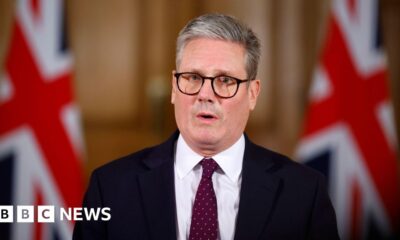
 News1 month ago
News1 month agoUK forces involved in response to Iran attacks on Israel
-

 News2 months ago
News2 months ago▶️ Media Bias: How They Spin Attack on Hezbollah and Ignore the Reality
-

 Science & Environment2 months ago
Science & Environment2 months agoHow to wrap your mind around the real multiverse
-

 Football1 month ago
Football1 month agoWhy does Prince William support Aston Villa?
-

 Sport1 month ago
Sport1 month agoBukayo Saka left looking ‘so helpless’ in bizarre moment Conor McGregor tries UFC moves on Arsenal star
-

 News1 month ago
News1 month ago▶ Hamas Spent $1B on Tunnels Instead of Investing in a Future for Gaza’s People
-

 Sport1 month ago
Sport1 month agoPhil Jones: ‘I had to strip everything back – now management is my focus’
-

 Technology1 month ago
Technology1 month agoSamsung Galaxy Tab S10 won’t get monthly security updates
-

 Technology1 month ago
Technology1 month agoMusk faces SEC questions over X takeover
-

 Sport1 month ago
Sport1 month agoChina Open: Carlos Alcaraz recovers to beat Jannik Sinner in dramatic final
-

 Sport4 weeks ago
Sport4 weeks agoSunderland boss Regis Le Bris provides Jordan Henderson transfer update 13 years after £20m departure to Liverpool
-

 TV1 month ago
TV1 month agoএই ডিভাইস দিয়ে দেখা যায় পৃথিবীর সব টিভি চ্যানেল! | Smart Tv Box | Independent TV
-
Business1 month ago
Bank of England warns of ‘future stress’ from hedge fund bets against US Treasuries
-

 Technology1 month ago
Technology1 month agoJ.B. Hunt and UP.Labs launch venture lab to build logistics startups
-

 Money1 month ago
Money1 month agoDWP reveals exact date that cold weather payments will start this winter – can you get free cash for your energy bills?
-

 Sport1 month ago
Sport1 month agoSturm Graz: How Austrians ended Red Bull’s title dominance
-

 Money1 month ago
Money1 month agoFive benefits changes the Government could make next month in its Autumn Budget – from PIP to fraud crackdown
-

 MMA1 month ago
MMA1 month ago‘I was fighting on automatic pilot’ at UFC 306


You must be logged in to post a comment Login